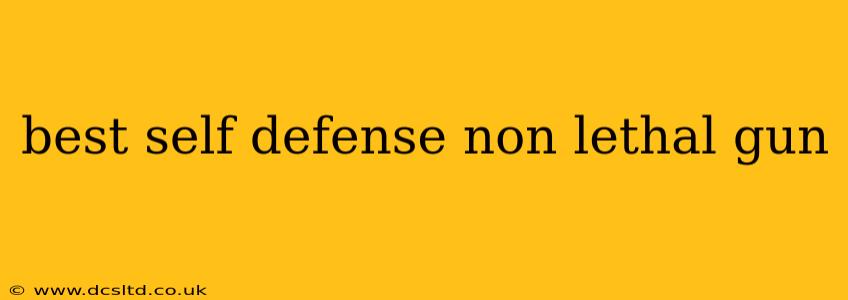Best Self-Defense Non-Lethal Guns: A Comprehensive Guide
Choosing the best non-lethal self-defense weapon is a crucial decision demanding careful consideration. While "gun" typically implies a firearm, the term "non-lethal gun" encompasses various devices designed to incapacitate an attacker without causing fatal injury. This guide explores top contenders, their pros and cons, and essential factors to consider before purchasing. Remember, the effectiveness of any self-defense tool depends heavily on proper training and responsible usage.
Understanding Non-Lethal Options:
Before diving into specific devices, it's vital to understand the limitations of non-lethal weaponry. While designed to incapacitate without killing, the potential for serious injury always exists. Factors such as distance, target area, and individual physiology influence the outcome. Always prioritize de-escalation and escape if possible.
Types of Non-Lethal "Guns":
Here are some prominent contenders in the non-lethal self-defense market:
1. Pepper Spray:
Pepper spray, or oleoresin capsicum (OC) spray, is a widely available and relatively inexpensive self-defense option. It causes intense burning sensations in the eyes, nose, and throat, temporarily incapacitating the attacker.
- Pros: Easy to carry, legal in most jurisdictions (with restrictions), relatively inexpensive.
- Cons: Wind can affect accuracy, requires close proximity, ineffective against individuals with reduced sensitivity to OC.
2. Stun Guns:
Stun guns deliver a high-voltage, low-amperage shock that temporarily disables an attacker by disrupting the nervous system. They come in various forms, including handheld devices and taser-style guns.
- Pros: Can effectively incapacitate an attacker at a slightly greater distance than pepper spray.
- Cons: Requires direct contact or very close proximity, effectiveness can be diminished by clothing, legal restrictions vary by location.
3. Air Soft Guns:
While generally not considered a primary self-defense tool, air soft guns (particularly those firing paintballs or rubber pellets) can deter an attacker or buy you time to escape.
- Pros: Relatively inexpensive, readily available.
- Cons: Low stopping power, requires precise aim, may not be effective against determined attackers. Legal restrictions vary significantly by location.
4. Other Non-Lethal Self-Defense Tools:
It's important to remember that non-lethal self-defense extends beyond "guns." Personal safety alarms, whistles, and even strong flashlights can serve as effective deterrents.
Choosing the Right Non-Lethal "Gun":
Several factors should guide your choice:
- Legality: Check your local and state laws regarding the ownership and use of non-lethal self-defense weapons. Regulations vary significantly.
- Effectiveness: Consider the device's range, ease of use, and potential impact on different types of attackers.
- Training: Regardless of the chosen tool, professional training is crucial for safe and effective use.
- Personal Comfort: Choose a weapon you are comfortable carrying and using in a stressful situation.
Frequently Asked Questions (PAA):
Q: Are non-lethal self-defense weapons always effective?
A: No, the effectiveness of any non-lethal weapon depends on various factors, including the attacker's physical and mental state, the environment, and the user's proficiency. While designed to incapacitate without killing, there's always a risk of injury.
Q: Can I use a non-lethal weapon to harm someone who isn't actively attacking me?
A: No, using a non-lethal weapon against someone who is not posing an immediate threat is illegal and could lead to serious consequences. Self-defense must be proportionate to the perceived threat.
Q: What should I do if I have to use a non-lethal self-defense weapon?
A: After using a non-lethal self-defense weapon, call emergency services immediately. Stay at the scene if it is safe to do so and cooperate with law enforcement.
Disclaimer: This information is for educational purposes only and does not constitute legal or professional advice. Consult with relevant authorities and professionals to ensure you comply with all applicable laws and regulations before purchasing or using any self-defense tool. Always prioritize de-escalation and escape if possible. This information should not be considered an endorsement of any specific product or brand.
